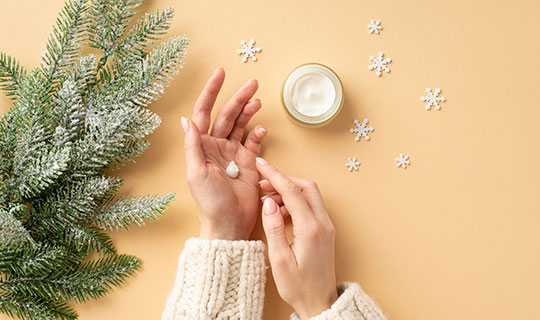
As the seasons change, so does your skin, and it is very common to experience dry skin in the winter months. Here are some tips from Daniel Groisser, MD, Section Chief of Dermatology at Cooperman Barnabas Medical Center, that you can follow to try and avoid irritated skin this year.
Moisturize after washing your skin. Anytime you wash your hands, face, body or use alcohol-based hand-sanitizer, your skin is being stripped of its natural oils that lock in moisture. It is vital to use moisturizer anytime you wash your skin, to replace this moisture and avoid your skin drying out.
Stay hydrated. Not drinking enough water throughout the day can affect the appearance of your skin and also make it more susceptible to drying out.
Wear gloves. When stepping outside, gloves can help provide a barrier against the winter elements that are responsible for drying out the skin on your hands.
Watch your water temperature. A hot shower or bath for an extended amount of time can cause damage to your skin, so it is better to keep the water temperature close to lukewarm. When washing dishes with hot water, silicone gloves can be worn to protect your skin.
Use a humidifier. Humidifiers help add moisture back into the air, which can be helpful when indoor heating is being used in the winter.
Avoid irritating fabrics. When dealing with sensitive skin you can reduce the risk of irritation by wearing loose, comfortable, and natural fabrics, that are washed with detergents free of harsh chemicals and fragrances.
Adjust your skin care routine. It might be best to simplify your skin care routine in the winter, avoiding products that have fragrance and alcohol in their ingredients. It is also important to go easier on using exfoliants and scrubs due to being more likely to break down your skin’s moisture barrier.
Other options. The use of overnight treatments can help to revitalize or prevent dry skin. In addition, using occlusives, like shea butter, cocoa butter or petroleum jelly, can help provide a barrier to lock moisture in your skin.
If you find your dry skin is not improving or getting worse, consider following up with your health care provider or dermatologist for advice. To find a dermatologist on staff at CBMC, go to our online physician directory or call 888-724-7123.